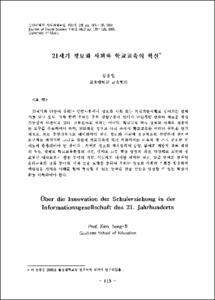自然法理念과 近代自然法學의 展開
- Alternative Title
- Theory of Natural Law and Developing Process of Modern Natural Law
- Abstract
- 오늘날 학자들의 관심은 권위, 정통성, 평등, 전쟁 및 공동체의 여러 문제에 집중되고 있다. 적어도 18세기 말까지 이러한 문제들을 해결하기 위해 사용된 주요 방법의 하나는 인간성에 내재하는 어떤 기본원리 내지 가치에의 호소 즉 자연법 이론?? 의존하는 것이었다.
자연법 이론의 방법 및 가정은 현대의 정치·사회사상에 계속 나타나고 있다. 자연법의 용어는 아직도 어떤 영역에서 분명히 사용되고 있다.
정치의 체계적 연구의 발전과 그리고 정치에 되풀이해서 일어나는 여러 문제의 주요 해결책에 관심을 갖는 사람이면 B.C5세기부터 18세기 말까지 정치사상에 있어 중요하고도 지배적인 주제였던 자연법 이론을 고려하지 않으면 안된다. 하나의 철학으로서 그리고 하난의 이데올로기로서 자연법 이론은 다음과 같은 세 가지 중요한 역사적 사건에 있어 중심적인 역할을 수행하였다. 그 사건은 첫째로 로마의 문명 및 법률이 서구에 미친 영향의 확산이었고 둘째로 중세에 있어서 기독교와 고전 문화의 융합이었으며 셋째로 16세기부터 18세기까지 자유 개인주의의 등장이었다. 자연법 이론은 이러한 각 발전 단계에 이용되어 정치적 의무의 성격 및 한계, 다양한 정부 형태의 평가 그리고 법률 및 정치의 도덕과의 관계를 결정하는 보편적이고 합리적인 기준을 제공하였다.
Current student concern is focused on the issues of authority, legitimacy, equality, war and community. One of the principal methods used to resolve these problems, at least until the end of the eighteenth century, has been through the appeal to certain basic principles or values inherent in human nature(the theory of natural law). The methods and assumptions of natural law theory continue to appear in contemporary political and social thought. The terminology of natural law is still, explicitly employed in certain areas.
Anyone interested in the development of the systematic study of politics, and in the principal solutions its recurring problems, must surely take into account theory which was a major or dominant theme in political thought from the fifth century B.C. until the end of the eighteenth century. As a philosophy and as an ideology it played a central role in three important historical events - the extension of the influence of Roman civilization and law over the Western Europe: the fusion of Christianity and classical culture in the Middle Ages; and the emergence of liberal individualism from the sixteenth to the eighteenth century. The theory of natural law was used in each of these developments to provide a universal, rational standard to determine the nature and limits of political obligation, the evaluation of competing forms of government, and the relation of law and politics to morals.
Current student concern is focused on the issues of authority, legitimacy, equality, war and community. One of the principal methods used to resolve these problems, at least until the end of the eighteenth century, has been through the appeal to certain basic principles or values inherent in human nature(the theory of natural law). The methods and assumptions of natural law theory continue to appear in contemporary political and social thought. The terminology of natural law is still, explicitly employed in certain areas.
Anyone interested in the development of the systematic study of politics, and in the principal solutions its recurring problems, must surely take into account theory which was a major or dominant theme in political thought from the fifth century B.C. until the end of the eighteenth century. As a philosophy and as an ideology it played a central role in three important historical events - the extension of the influence of Roman civilization and law over the Western Europe: the fusion of Christianity and classical culture in the Middle Ages; and the emergence of liberal individualism from the sixteenth to the eighteenth century. The theory of natural law was used in each of these developments to provide a universal, rational standard to determine the nature and limits of political obligation, the evaluation of competing forms of government, and the relation of law and politics to morals.
- Issued Date
- 1996
- Type
- Research Laboratory
- Alternative Author(s)
- Kim,Woo-Sung
- Publisher
- 사회과학논집
- Language
- kor
- Rights
- 울산대학교 저작물은 저작권에 의해 보호받습니다.
- Citation Volume
- 5
- Citation Number
- 3
- Citation Start Page
- 67
- Citation End Page
- 90
- Appears in Collections:
- Research Laboratory > Journal of social science
- 파일 목록
-
-
Download
 000002023767.pdf
기타 데이터 / 1.77 MB / Adobe PDF
000002023767.pdf
기타 데이터 / 1.77 MB / Adobe PDF
-
Items in Repository are protected by copyright, with all rights reserved, unless otherwise indicated.